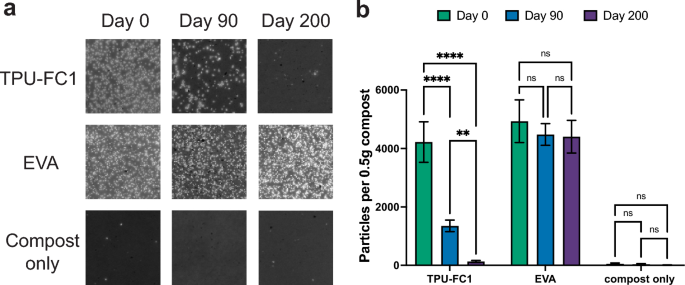Accumulation of microplastics in the natural environment is ultimately due to the chemical nature of widely used petroleum-based plastic polymers, which typically are inaccessible to biological processing. One way to mitigate this crisis is adoption of plastics that biodegrade if released into natural environments. In this work, we generated microplastic particles from a bio-based, biodegradable thermoplastic polyurethane (TPU-FC1) and demonstrated their rapid biodegradation via direct visualization and respirometry. Furthermore, we isolated multiple bacterial strains capable of using TPU-FC1 as a sole carbon source and characterized their depolymerization products. To visualize biodegradation of TPU materials as real-world products, we generated TPU-coated cotton fabric and an injection molded phone case and documented biodegradation by direct visualization and scanning electron microscopy (SEM), both of which indicated clear structural degradation of these materials and significant biofilm formation.
Conclusion
In this work, particle count and respirometry experiments demonstrated that microplastic particles from a bio-based thermoplastic polyurethane can rapidly biodegrade and therefore are transiently present in the environment. In contrast, microplastic particles from a widely used commercial thermoplastic, ethyl vinyl acetate, persists in the environment and showed no significant signs of biodegradation over the course of this experiment. Bacteria capable of utilizing TPU-FC1 as a carbon source were isolated and depolymerization of the material was confirmed by the early accumulation of monomers derived from the original polymer, which are metabolized by microbes in short order. Finally, we demonstrated that prototype products made from these materials biodegrade under home compost conditions. The generation of microplastics is an unavoidable consequence of plastic usage and mitigating the persistence of these particles by adoption of biodegradable material alternatives is a viable option for a future green circular economy.

Robin Edgar
Organisational Structures | Technology and Science | Military, IT and Lifestyle consultancy | Social, Broadcast & Cross Media | Flying aircraft

